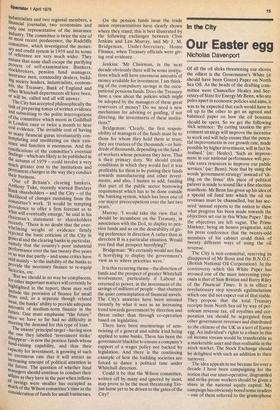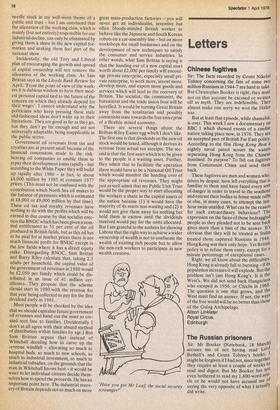In the City
Our Easter egg
Nicholas Davenport
Of all the oil slicks threatening our shores the oiliest is the Government's White (it should have been Green) Paper on North Sea Oil. As the heads of the drafting committee were Chancellor Healey and Sec retary of State for Energy Mr Benn, who are poles apart in economic policies and aims, it was to be expected that each would have to oil up to the other to get an agreed and balanced paper on how the oil bonanza should be spent. So we get the following slick sentence: 'By cutting taxation the gov ernment strategy will improve the incentive to work and will help ensure that the poten tial improvements in our growth rate, made possible by higher investment, will in fact be realised.' (sic: Healey). 'Such an improve ment in our national performance will pro
vide extra resources to improve our public services.' (sic: Benn). Note that by using the
words 'government strategy' instead of 'sitting on the fence' this piece of political palaver is made to sound like a fine election manifesto. Mr Benn has given up his idea of a special oil fund into which the oil tax revenues must be channelled, but has secured 'annual reports to the nation to show what progress has been made towards the objectives set out in this White Paper.' But the objectives are left vague. The Prime Minister, being an honest pragmatist, told his press conference that the twenty-odd members of his cabinet could think of twenty different ways of using the oil revenue.
The City is non-committal, reserving its disapproval of Mr Benn and the B.N.O.C. (British National Oil Corporation). In the controversy which this White Paper has aroused one of the most interesting proposals is that of Sam Brittan and Barry Riley of the Financial Times. It is in effect a revolutionary step towards egalitarianism which one did not expect out of that stable. They propose that the total Treasury receipts from North Sea oil by way of petroleum revenue tax, oil royalties and corporation tax should be segregated from other government revenues and distributed to the citizens of the UK as a sort of Easter egg. An individual's rights to a share in this oil income stream would be transferable as a marketable asset and thus realisable in the stock market. The Stock Exchange should be delighted with such an addition to their turnover.
The idea appeals to me because for over a decade I have been campaigning for the notion that our unco-operative, disgruntled and strike-prone workers should be given a share in the national equity capital. My campaign has obviously bored some readers — one of them referred to the gramophone
needle stuck in my well-worn theme of a public unit trust — but I am convinced that the alienation of the working class, which is mainly (but not entirely) responsible for our industrial decline, can only be eliminated by giving them a share in the new capital formation and making them feel part of the national show.
Incidentally, the old Tory and Liberal plan of encouraging the growth and spread of capital ownership will not remove the alienation of the working class. As Sam Brittan says in the Lloyds Bank Review for April: 'From the point of view of the workers it is dubious wisdom to have their modest personal capital tied to the future of the concern on which they already depend for their wages'. I cannot understand why the politicians who keep pressing these stale old-fashioned ideas don't wake up to their limitations. They are good as far as they go, but they don't go far enough and are not universally adaptable, being inapplicable in the public sector.
Government oil revenues from tax and royalties are at present small because of the financial concessions made to the riskbearing oil companies to enable them to repay their development loans rapidly — but according to the White Paper they will build up rapidly after 1980 — in fact, to about £4,000 million by 1985 at constant 1977 prices. (This must not be confused with the contribution which North Sea oil makes to the balance of payments which is estimated at £8,000 or £9,000 million by that time). These oil tax and royalty revenues have nothing to do with the profits which will be earned in due course by that socialist erection the BNOC which has been given a nominal entitlement to 51 per cent of the oil produced in British fields, but as this oil has to be paid for at market prices there is not much financial profit for BNOC except in the few fields where it has a direct equity stake. Disregarding BNOC, Sam Brittan and Barry Riley calculate that, taking 2.3 adults per household, the capital value of the government oil revenues in 1980 would be £2,050 per family which could be distributed in an issue of 41 million certificates. They propose that the scheme should start in 1980 with the revenue for that year being collected to pay for the first dividend early in 1981.
Most people will be shocked by the idea that we should capitalise future government oil revenues and hand out the asset so created scot free to families. (Incidentally I don't at all agree with their absurd method of distribution within families by age.) But Sam Brittan argues that instead of Whitehall deciding how to carve up the ievenue windfall — allocating so much to hospital beds, so much to new schools, so much to industrial investment, so much to industrial subsidies, on the grounds that the man in Whitehall knows best — it would be wiser to let individual citizens decide themselves how to spend the proceeds. He has an important point here. The industrial recovery of Britain depends not so much on more great mass-production factories — you will never get an individualist, inventive but often bloody-minded British worker to behave like the Japanese and South Korean robots on a car-assembly line — but on more workshops for small businesses and on the development of new techniques to satisfy the consumer and service industries. In other words, what Sam Brittan is saying is that the handing out of a new capital asset worth about £2,000 per family will encourage private enterprise, especially small private enterprise, to work more, invent more, develop more, and export more goods and services which will lead to .the recovery of Britain. The socialist, the communist, the bureaucrat and the trade union boss will be horrified. It would be turning Great Britain away from the totalitarian and possibly communist state towards the free enterprise of a flexible mixed economy.
There are several things about the Brittan-Riley Easter egg which I don't like. The first one is that dividends on the new oil stock would be taxed, although it derives its revenue from actual tax receipts. The second is that the first asset which is to be given to the people is a wasting asset. Further, they admit that to facilitate the operation there would have to be a National Oil Trust which would monitor the handing over of the appropriate oil revenues. They might just as well admit that my Public Unit Trust would be the proper way to start allocating the workers a share in the capital assets of the nation because (1) it would have the majority of its assets non-wasting and (2) it would not give them away for nothing but hold them in escrow until the dividends received would pay for the units allocated. But I am grateful to the authors for showing Labour that the right way to achieve a wider ownership of wealth is not to confiscate the wealth of existing rich people but to allow the non-rich workers to participate in new wealth creation.



































 Previous page
Previous page